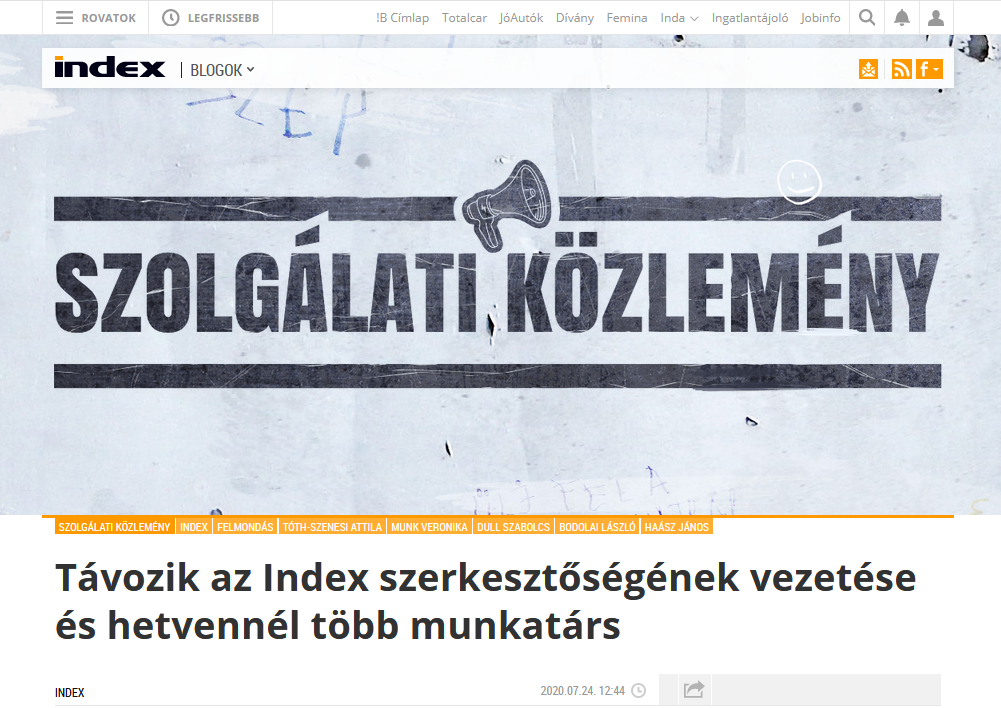Press freedom in Hungary is once again under attack. The editor-in-chief of Index.hu, the largest and most influential of the country’s remaining independent media, was fired earlier this week, just a month after the outlet declared that its independence was under threat from external pressure. Today, the outlet’s entire editorial board and some 80 other journalists resigned in protest, saying a red line had been crossed. Make no mistake: this is a devastating blow to journalism in Hungary.
We’re not speaking about just any other independent outlet. Index is (was) a bulwark. The site was Hungary’s largest news portal, with an estimated 1 million real daily users. It accounts for nearly half of all page views among independent media. Unsurprisingly, this also makes it a target. Speculation had been rife about when FIDESZ and its allies would move against Index.
For Hungary media watchers, the turmoil at Index follows an all-too-familiar pattern, one which IPI has previously documented. The Hungarian government has never sought to openly repress the media. There are no jailed journalists, no dramatic newsroom raids, no trumped-up criminal prosecutions; physical violence against the press is rare. Instead, Viktor Orbán’s FIDESZ party has taken a much more calculated, surreptitious route to controlling the flow of information. Independent outlets are first starved of resources through the government’s manipulation of the media market and then, once weakened, conveniently placed in the hands of government-friendly owners who deliver the final death-blow, ousting editors and flipping the editorial line. The empty shells are either closed (Népszabadság, abruptly closed by Orbán-allied investors in 2016) or turned into pro-Orbán mouthpieces (the oft-cited, once-proud critical news site Origo, forced from the hands of its German owner and promptly turned). This is how press freedom is eliminated in Europe in 2020.
This system has served Orbán and FIDESZ well, satisfying its need for plausible deniability. Despite Hungary’s aggressive dismantling of media freedom over the past 10 years and establishment of an obedient pro-government media empire, the EU has done little to rein in a government that much more closely resembles authoritarian Turkey or Russia than the EU’s democratic ideal. The fact that EU leaders failed to agree this week on a strong mechanism tying funding to the rule of law only vindicates Orbán’s strategy.
Like other independent media in Hungary, Index was being suffocated economically. While the Covid-related economic crisis obviously doesn’t help, it is ultimately a pile-on to years in which the government deprived Index and other critical outlets of state-funded advertising and pressured commercial advertisers to stay away.
At the same time, FIDESZ allies slowly began to infiltrate Index’s complex ownership and management structure. The outlet is directly owned a foundation designed to protect its independence. So the soft underbelly has turned out to be a company, Indamedia, that controls Index’s advertising. Earlier this year, a controlling stake in Indamedia was purchased by Miklós Vaszily, a businessman with close links to Orbán who has played a key role in building FIDESZ’s loyal media army, especially through orchestrating the takeover of Origo. Vaszily’s foot in the door said enough, the writing was on the wall. Indamedia’s controversial business plans for Index, which journalists viewed as an effort to undermine its editorial independence, set off the current chain of events.
Index might be closed. Or, given its market leadership, it might be allowed to survive, even allowed to preserve some of its critical voice – but possibly just enough to allow Orbán to hold it up as proof that press freedom exists in Hungary, without posing any real threat to FIDESZ’s power.
This week’s events involving Index are dramatic and heartbreaking. But they’re no anomaly. Another media outlet has fallen victim to the Orbán model, to a highly efficient and clever system of media capture that Hungary’s EU partners either don’t or don’t want to understand, much less stop. Meanwhile, FIDESZ will keep collecting its generous checks from Brussels. Nothing new to see here.

This blog by IPI is part of the Media Freedom Rapid Response (MFRR), a Europe-wide mechanism which tracks, monitors and responds to violations of press and media freedom in EU Member States and Candidate Countries.
